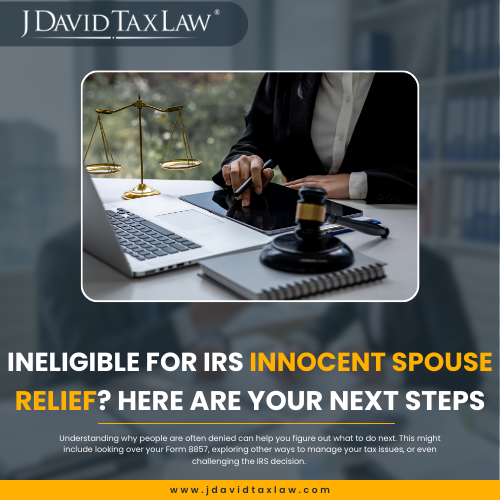The IRS rarely forgives penalties without a fight. Every year, thousands of penalty abatement requests are denied, not because taxpayers don’t deserve relief, but because of small errors that trigger automatic rejections. From missing returns to the wrong form, the IRS has strict rules, and one mistake can cost you thousands.
Knowing why First Time Penalty Abatement gets rejected and how to present your case correctly is the difference between another denial and a successful outcome.
Key Takeaways
- The IRS most often denies abatement for missing returns, unpaid taxes, wrong forms, or prior relief.
- Meeting all First Time Abatement requirements is essential to avoid rejection.
- Even if your penalty abatement request was denied, appeals and other relief options may still apply with the right legal strategy.
Reason #1 – Missing or Unfiled Tax Returns
The IRS will not grant penalty abatement if you have unfiled or late tax returns. First Time Penalty Abatement (FTA) is only available to taxpayers with a clean compliance record, which means every required return must be filed before relief is considered.
Many taxpayers rush to submit Form 843 or request penalty relief by phone without first resolving their filing obligations. This oversight almost always leads to an automatic denial.
How to avoid it: Make sure all required returns — individual, business, or payroll — are filed, even if you can’t pay the balance in full. Once your filings are current, you may qualify for FTA or other relief options.
The IRS is Forgiving Millions Each Day. You Could Be Next.
Reason #2 – Unpaid or Unresolved Tax Balances
Penalty abatement is never approved when taxes remain unpaid with no plan in place. The IRS requires that you either pay the balance in full or enter into an approved installment agreement before your request is even considered. Submitting an abatement request while ignoring the underlying debt is one of the fastest ways to get denied.
Even taxpayers who qualify for First Time Abatement are rejected when an outstanding balance is left unresolved. The IRS views this as noncompliance, and without compliance, there is no relief. Read here how you can resolve years of unpaid taxes.
How to avoid it: Pay your tax liability as soon as possible or establish a payment plan before requesting penalty abatement. Doing so demonstrates good faith and keeps your request in line with IRS requirements.
Reason #3 – Using the Wrong Form or Process
The IRS is strict about procedure, and using the wrong process almost guarantees a denial. Many taxpayers try to request abatement through a phone call or by mailing a casual letter, only to be rejected. While an IRS agent may note your request by phone, most cases require a formal submission using Form 843 (Claim for Refund and Request for Abatement), along with supporting documentation.
Submitting the wrong form, leaving sections incomplete, or failing to include proof of eligibility are common mistakes that trigger quick denials. The IRS doesn’t make exceptions for paperwork errors. Read here How a Tax Attorney Can File a Strong Request for First Time Penalty Abatement.
How to avoid it: Always use the correct form and include all required documentation. A properly prepared request not only avoids automatic rejection but also increases your chance of approval on the first submission.
Reason #4 – Weak or Unsupported Reasonable Cause
Another common reason for a penalty abatement request denied is giving the IRS a “reasonable cause” explanation without proof. Many taxpayers say they were sick, had personal issues, or couldn’t access records — but without documentation, the IRS doesn’t consider this enough.
The IRS expects evidence that clearly shows why you could not file or pay on time. Hospital records, natural disaster declarations, or correspondence showing system issues are the kinds of proof that can support a claim. Without them, the request is treated as incomplete, leading to an IRS reasonable cause denial.
How to avoid it: If you plan to include reasonable cause in your abatement request, back it up with clear, dated evidence. Strong documentation turns a weak explanation into a valid reason the IRS may accept.
Reason #5 – Prior Penalties or Past Relief
The IRS checks your transcript penalty history before approving First Time Abatement. If you’ve had penalties within the past three years, or if you’ve already used the program once, your request will almost certainly be denied. This is one of the most common IRS First Time Abatement denial reasons because taxpayers don’t realize the program is truly a one-time benefit.
Another point of confusion comes from the so-called IRS one-time forgiveness program. While First Time Abatement is often described this way, it isn’t blanket forgiveness — it has strict limits. If your record shows prior relief or unresolved penalties, the IRS will treat your penalty abatement request denied without further consideration.
How to avoid it: Review your IRS transcripts to confirm eligibility before filing. If you’ve already used First Time Abatement, your best chance is to pursue another relief option, such as a properly documented reasonable cause claim.
How to Improve Your Chances of Approval
The IRS holds abatement requests to a high standard, and small mistakes often mean rejection. The best way to strengthen your case is to ensure full compliance, submit the correct paperwork, and back up your claim with clear documentation.
If your penalty abatement request was denied, that doesn’t have to be the end. You may still qualify through an appeal or other forms of relief, but success depends on how the request is presented.
Case Example:
Ryan came to us after the IRS denied his penalty abatement request. His claim was initially rejected, but after multiple appeals and a properly documented submission, we secured a full waiver of more than $150,000 in penalties and interest.
This outcome shows that even after a denial, relief is possible with the right legal strategy. Our tax attorneys know how the IRS evaluates these cases and can position your request to meet approval.
Call (888) 342-9436 today or visit https://www.jdavidtaxlaw.com/services/first-time-penalty-abatement/ to improve your approval chances.
IRS Penalty Abatement Denied? Here’s Your Next Step
If your penalty abatement request was denied, you still have the right to appeal. The IRS Office of Appeals is an independent body that reviews denials to ensure taxpayers are treated fairly. Many taxpayers succeed at this stage when the request is properly documented and backed by legal representation.
Timing is critical. In most cases, you must file your appeal within 30 days of receiving the denial letter. Missing this deadline can forfeit your right to appeal, leaving penalties in place.
How to proceed: If you believe your IRS penalty relief eligibility was overlooked, a tax attorney can file a timely appeal, prepare the required documentation, and position your case for the best chance of approval.
Related IRS Resources
For more details, you can review the IRS’s own guidance on penalty relief programs:
- IRS Penalty Relief Overview
- IRS First Time Abate Administrative Waiver
- IRS Form 843
- IRS Penalty Handbook (IRM 20.1)
Conclusion
Getting an IRS penalty abatement denied can feel discouraging, but in most cases, the denial comes down to avoidable errors — not because relief is impossible. The IRS has strict rules for First Time Abatement, and understanding those rules is the difference between rejection and approval.
If your penalty abatement request was denied or you’re worried about filing it correctly, you don’t have to take on the IRS alone. At J.David Tax Law, our tax attorneys know how to build and submit requests that meet IRS standards, and we’ve helped clients overturn denials and eliminate thousands in penalties.
Frequently Asked Questions
If the IRS rejects your Form 843 penalty abatement request, you may still qualify under reasonable cause or through an appeal. An attorney can review your case, strengthen documentation, and resubmit the request correctly.




















